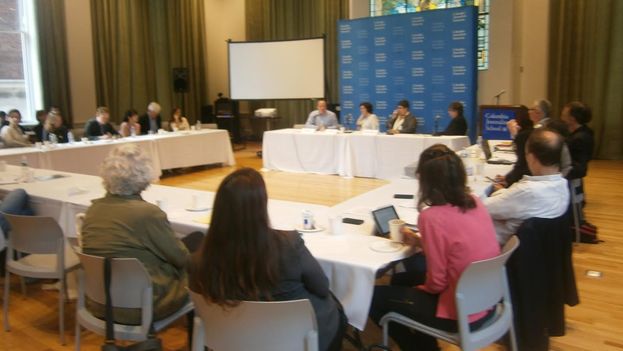
14ymedio, Miriam Celaya, New York, 19 October 2014 — If it weren’t because the mediations are in English, because of the discipline in the adhering to the schedules, because of the coordination and care of each detail and because the quality of the service, it could be said that the conference covering “Cuba in an Era of Change”, in which I am taking part as an invitee, could be taking place at an official Cuban venue.
However, it is all taking place at the Columbia School of Journalism, New York, though, on occasion, the debate and its members seem to be following a script designed to please even the most demanding Castro delegate, not because of its focus on issues of the lifting of the embargo–not just in the news coverage in a changing Cuba where, nevertheless, we continue to endure a shocking lack of freedom–but in the combined half-truths and warped fantasies that aim to lay the foundations of the futility of American policy towards the Cuban government.
There is no doubt about the need to implement new policies to clear the current impasse in US-Cuba relations, but it is incorrect to regard as null the effect of the embargo on the Cuban government, the same way that “it’s an excuse that allows Castro to stifle dissent” is a thesis that constitutes a candid remark, to put it delicately.
If indeed the embargo is harmless, how do we explain the repeated complaints of the ruling caste, qualifying it as “criminal policy”, especially after the fall of the so-called European real socialism, when the huge subsidies that allowed the implementation of social programs ended, yet still nurture the “Castro” legend in almost every forum?
As long as the image of “the kind dictatorship” prevails, the one that universalized health and education “for the people” (…) Cubans will, unfortunately, continue to be fucked.
But life for Cubans will not improve by reinforcing old myths. So long as the image of “the kind dictatorship”, the one that universalized health and education “for the people”, forgetting that the price paid was our freedom; while that strange fascination about Fidel Castro, the maker of the longest dictatorship in the western hemisphere, continues to exist; while we continue to fall into the vice of alluding about those who are considered adversaries without allowing them participation in the debate, or just while some lobbyists, perhaps too sensitive, leave the room when someone–with the moral authority conferred by being Cuban and living in Cuba–dares to reveal truths that they don’t want to hear; while the voices of those who are really suffering the ebbs and tides of the policies are absent, it will not matter whether there is an embargo or not. Cubans will, unfortunately, continue to be fucked.
These past few days I have been attending, perplexed, the debates of many speakers who think they know, perhaps with the best motivation in the world, what the Cuban reality is and what is best for us. I’ve heard the old version of Cuban History where Fidel Castro is heir to the Martí philosophy, and successor to the struggle for independence. I have heard many compliments about the fabulous achievements of the Cuban system in matters of ecology, social services and even in economics. I have discovered the Cuba which those who move public opinion in this country want to show.
The notable absentees are still the Cubans, not just the ones from Miami, who they generically include in a big sack in these parts, as if they were mere numbers to swell statistics and fill out surveys, who they consider equal to Haitians, who flee their country for purely economic reasons, but also the thousands who continue to emigrate by any means in an ever-growing and constant way, and the millions condemned to drag a life of poverty and hopelessness in our Island. But the most eloquent vacuum, except for my exceptional presence here, is that of the journalists and independent bloggers that do cover the day-to-day from the depth of the Island. Once again, the foreigners’ sugar-coated view has prevailed.
Privilege of the powerful, the media and politicians, for whom Cuba is only an exotic and beautiful island, long ruled by a genius-–perhaps a tad tyrannical, but who will have to die someday–and replaced, in dynastic order, by his brother. An island inhabited by the most cheerful and happy people in the world.
Translated by Norma Whiting
